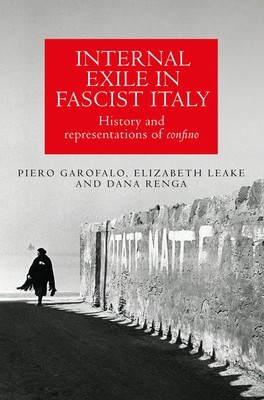
- We will send in 10–14 business days.
- Author: Piero Garofalo
- Publisher: Manchester University Press
- ISBN-10: 152616387X
- ISBN-13: 9781526163875
- Format: 15.6 x 23.4 x 1.2 cm, softcover
- Language: English
- SAVE -10% with code: EXTRA
Reviews
Description
Internal exile in Fascist Italy offers a clear and concise introduction to confino, a form of imprisonment used during the Fascist ventennio that saw antifascist dissidents exiled to remote islands or tiny inland villages.
The book examines confino from a historical, political, social and cultural perspective, through both a broad overview and close analyses of particular cases and situations. The book is organised in two sections. Part one provides a case study of the political colony on the island of Lipari and a historical overview of internal exile. Part two focuses representations of confinement in literature and film. It examines the varieties of self-expression - memoirs, letters, and literature - used by prisoners to describe their experiences and investigates how filmmakers interpret these events, places, and people; particularly exploring how film portrays the repression of homosexuality.
The act of confinement was a tool that allowed Mussolini to bypass the judiciary, and to targeted political dissidents, ethnic and religious minorities, and members of the gay community among others. This book seeks to contextualise a political practice that continues to find applications in twenty-first-century detention policies; and to enhance the understanding of how contemporary social discourse promotes political agendas rooted in issues - such as populism, anti-terrorism, nationalism and ethnocentrism - that are historically related to Fascism's suppression of dissidents
Internal exile in Fascist Italy offers a coherent and accessible portrait of confino in its various manifestations. The authors argue that internal exile is not purely political: it possesses a cultural history that speaks to the present. Although directed towards students and specialists of Italian history, literature, film and culture, the study is accessible to those with a general interest in Fascism.
EXTRA 10 % discount with code: EXTRA
The promotion ends in 20d.06:48:06
The discount code is valid when purchasing from 10 €. Discounts do not stack.
- Author: Piero Garofalo
- Publisher: Manchester University Press
- ISBN-10: 152616387X
- ISBN-13: 9781526163875
- Format: 15.6 x 23.4 x 1.2 cm, softcover
- Language: English English
Internal exile in Fascist Italy offers a clear and concise introduction to confino, a form of imprisonment used during the Fascist ventennio that saw antifascist dissidents exiled to remote islands or tiny inland villages.
The book examines confino from a historical, political, social and cultural perspective, through both a broad overview and close analyses of particular cases and situations. The book is organised in two sections. Part one provides a case study of the political colony on the island of Lipari and a historical overview of internal exile. Part two focuses representations of confinement in literature and film. It examines the varieties of self-expression - memoirs, letters, and literature - used by prisoners to describe their experiences and investigates how filmmakers interpret these events, places, and people; particularly exploring how film portrays the repression of homosexuality.
The act of confinement was a tool that allowed Mussolini to bypass the judiciary, and to targeted political dissidents, ethnic and religious minorities, and members of the gay community among others. This book seeks to contextualise a political practice that continues to find applications in twenty-first-century detention policies; and to enhance the understanding of how contemporary social discourse promotes political agendas rooted in issues - such as populism, anti-terrorism, nationalism and ethnocentrism - that are historically related to Fascism's suppression of dissidents
Internal exile in Fascist Italy offers a coherent and accessible portrait of confino in its various manifestations. The authors argue that internal exile is not purely political: it possesses a cultural history that speaks to the present. Although directed towards students and specialists of Italian history, literature, film and culture, the study is accessible to those with a general interest in Fascism.


Reviews